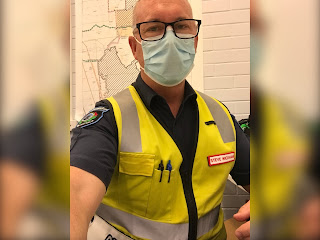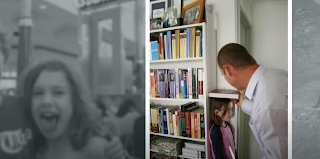I’ve waited a while before writing this article. I’ve been ruminating on it for some time; two months actually, and for me that’s a long time. I needed to see something stick.
The last six months of last year was a season where I was overwhelmed and triggered on a weekly, usually Sunday, basis. Not only that, but on these weekly occasions I’d get to the point where I wanted to give up. I was reaching the end of myself. It was scary because, as Proverbs 13:12 says, “Hope deferred makes the heart sick,” and my heart felt vulnerable.
Sounds drastic I know, but it was the truth—for six days I’d work hard, productively, satisfactorily, contentedly, yet on that seventh day I’d fold in the spiritual attack of despair. I was miserable to live with on those days. The amount of long complaining conversations that my wife put up with on those days was tiring for her. I would ‘bend her ear’ for an hour or more! No matter how much I complained about my tiredness for working the equivalent of one-and-a-half or two full-time jobs I just had no peace.
On those days, I just couldn’t resolve the despair I would slide into. Yet, I wasn’t depressed. Life on those other six days per week was normal and even great. But the seventh day I felt crushed.
Fortunately from a faith perspective, there were numerous divine interventions that reminded me I wasn’t alone.
I had a pastor friend who started to text me 7.30am every Sunday morning without fail, right about the time I was doing my final preparation for the message I was going to preach, often when I was tired. Those texts were a powerful instrument for hope.
One Sunday in church before I got up to speak, I had a person walk up and whisper a prophetic message—I didn’t really know this person, but what she had to say was exactly what I needed to hear. It gave me hope that I was seen in my plight.
Each of those hard Sundays where I would literally have all the energy sucked out of me were followed by Mondays where new life was breathed into me. Somehow, no matter how bad my low days got, there were regular enough breakthroughs that reminded me that my life was still headed somewhere good.
Though I regularly lost hope, hope had not lost its grip on me.
So what was the problem? I was unsettled, wanting something else. I didn’t like, and therefore didn’t accept, where I was. I wanted to be elsewhere. What I was doing wasn’t good enough. I was in a hurry to get to the next phase of my life. And how did I discover I was unsettled?
Last year I was seriously considered for five pastoral positions (interviewed for all five—and I withdrew from four before a decision had been made) and one of those positions I was offered the job (as a community chaplain) and I’d actually accepted the role. In December I had my resignation email written out and was one conversation away from leaving my role in the fire and emergency services. A start date in February 2022 for the new position had been set. I was already planning how I’d start that role with the new employer.
Then something happened.
On December 19, after another triggered Sunday night, that ended in an argument with my wife because I wasn’t happy, we were sitting on the side of the bed feeling defeated and suddenly something dawned on me.
I was fearful of making the wrong decision, of regretting leaving a secure job for something that was exciting yet had a whole range of unknowns about it. I recall saying to Sarah, “I think I’m fearful... I can see a vision now about just how close I was going to get to leaving DFES.” It was true. In getting ready to leave, suddenly I could see that all along I was never going to leave, but that I was going to come super close to it. That vision was another sign.
During the week before Christmas and through the week before New Year, I continued feeling tired every second day. I really feared that I was burnt out. I couldn’t see how I’d recover. Life was just too frenetic. And what I found really anxiety-evoking was I wasn’t going to get a break at year’s end.
But something happened the morning after that December 19 Sunday night.
Once I resolved that I was staying in my fire and emergency services role, I could suddenly see the purpose in it. But only once I’d committed. I began to see that I was there by divine appointment. It’s what I needed to see. I also began to see that the pastoral position I’ve been in for a few years now is right where I’m supposed to be.
I’d grown chronically unsettled and wanting to be elsewhere, preferably back in full-time ministry, but I’d failed to see that I was already in full-time ministry—on mission. I had my mission, but I couldn’t accept it.
As I faced the truth, that I’m right where I need to be, everything began to click into place.
Suddenly, the enormous workload I’ve got was so much more achievable. I’d learned in my AA days that there are two pests of the thought life: hurry and indecision.
The indecision I’d been living in for at least five years took me to the brink of burnout. It was indecision—a lack of commitment to the present mission—that was burning me out. Living without hope is exhausting.
What’s the lesson in all this?
Commit fully to the life you’ve got, to the life you’ve been put into. Stop looking over the fence to a lawn that looks greener but has its own perils. Do well what you can now and leave the rest in faith that it all works out in the end. Most of all, commit to those who have committed to you, and stick close to those who you can partner with.
Find the faithful people in your endeavours and almost everything else is palatable.
Sometimes it’s not until you fully commit that you see all of what there is to see.
Finally, it took me over 12 months to settle in my present role, being such a big re-adjustment going back to secular employment for the first time in eight years. There were several reasons I felt like I struggled to fit. But as soon as I committed, those reasons waned and lost their significance.
I find this to be the case in the present situation: in committing my way earnestly to a thing, in accepting where I’m at, suddenly the barriers are moved out of the way, and that brings a commanding sense of peace.







